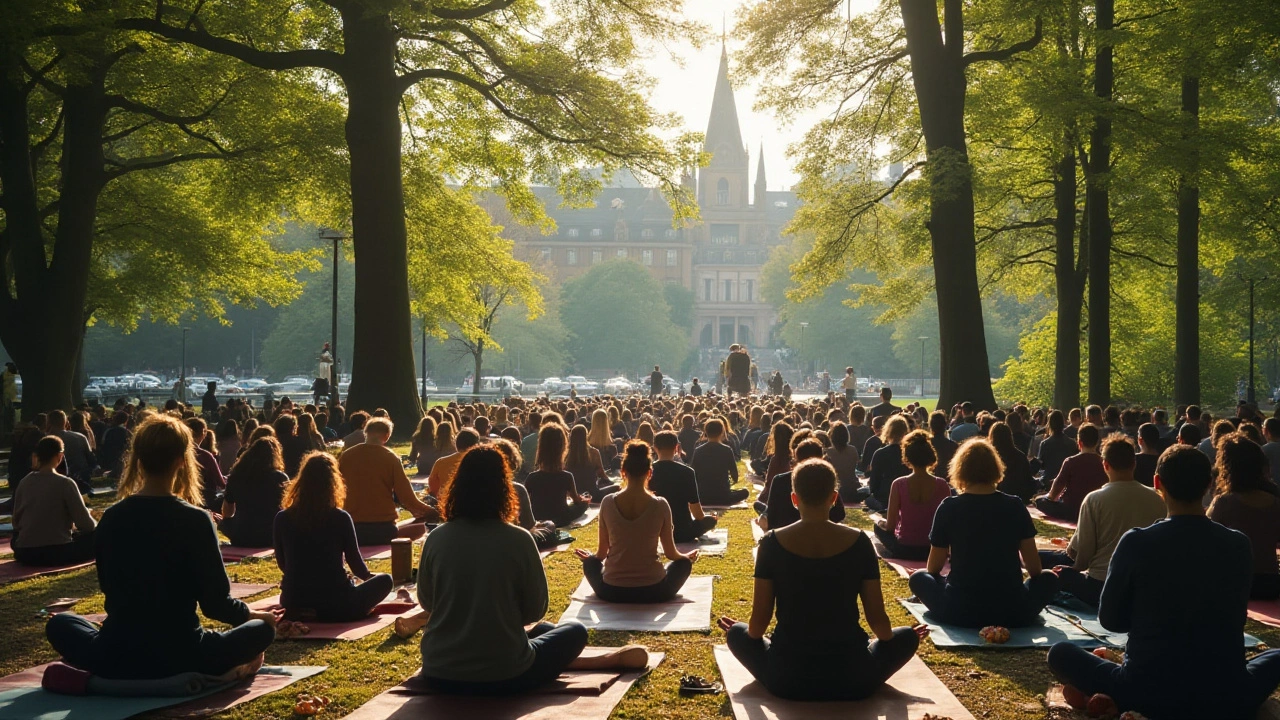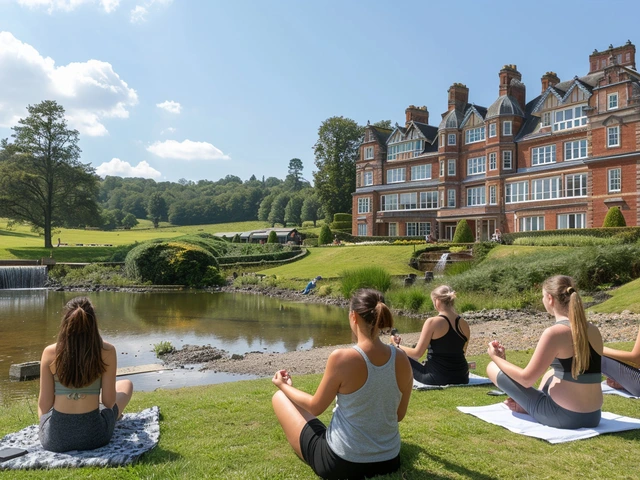In an age where stress often feels insurmountable, the ancient practice of meditation stands as a beacon of hope. This practice, revered for its simplicity and effectiveness, has been aiding individuals in finding peace amidst daily chaos. Meditation is more than just a moment of silence; it's a deliberate act of finding balance and tranquility within oneself.
Even setting aside a few minutes each day can lead to profound changes in the mind and body. By engaging in meditation, many report a newfound sense of calm and clarity, navigating life's challenges with enhanced ease. As we delve into the various aspects of meditation, you'll discover how this practice can transform your daily life into something more manageable and serene.
- Understanding Meditation
- Benefits of Meditation for Stress Relief
- Different Meditation Techniques
- Integrating Meditation into Your Daily Life
Understanding Meditation
Meditation often conjures images of serene individuals sitting cross-legged in a quiet room. While this image holds some truth, meditation is actually a dynamic and diverse practice that has been evolving for thousands of years. At its core, meditation is about training the mind to achieve a state of heightened awareness and focused attention. This mental exercise is as crucial for mental health as regular physical activity is for physical fitness. For ages, people across different cultures have not only practiced meditation for stress relief but have also harnessed its power to deepen their understanding of the mind and consciousness.
Historically, meditation practices emerged from ancient traditions like those of Hinduism and Buddhism, primarily as a spiritual exercise, but its benefits have transcended religious boundaries. Research over decades has shown that meditation positively impacts the brain by reducing the production of cortisol, the primary stress hormone. This results in lower stress levels and a calmer state of mind, paving the way for a more balanced emotional state. A remarkable aspect of meditation is its versatility; it can be as simple as focusing on one’s breath for a few minutes or as structured as following guided sessions designed to reach specific goals.
The Mechanics of Meditation
One might ask, how does one meditate effectively? Understanding the basic mechanics can demystify the process, encouraging more people to embrace it. Generally, meditation involves three key components: focused attention, relaxed breathing, and a quiet environment. Focused attention can be on a word, mantra, image, or even the rhythm of one's own breath. This concentration is crucial because it frees the mind from distractions, reducing clutter and fostering inner peace. Breathing plays a significant role; by adopting deep, even breaths, the body naturally shifts into a more calming state, promoting relaxation and easing mental tension.
"The thing about meditation is that you become more and more you." - David Lynch
Choosing the right environment is another essential factor for a fruitful meditation session. While quietude is preferable, it's not always necessary to be in complete silence. Some people meditate to soft, calming music or nature sounds. The key is to minimize interruptions, ensuring the focus remains inward. By understanding and embracing these elements, anyone can begin their journey toward mental clarity and stress management. Given its simplicity, one might wonder why more people haven't attempted to integrate meditation into their lives. Often, the perception that it requires extensive time or pre-existing knowledge acts as a barrier. However, meditation is welcoming to beginners, allowing them to start small and gradually build their practice at a comfortable pace.

Benefits of Meditation for Stress Relief
Meditation has been a cornerstone in reducing stress, providing countless people with the tools to face life's pressures more calmly. The practice, rooted in ancient traditions, focuses on calming the mind and enhancing self-awareness. Through meditation, individuals often discover a transformed inner world where stress doesn't rule. One of the key benefits of meditation is its ability to lower cortisol levels. Cortisol, often called the stress hormone, is released in response to stress. High levels of cortisol can lead to various health issues, including anxiety, depression, and even memory loss. By lowering cortisol levels, meditation helps in stabilizing mood and reducing anxiety.
The mind's power is extraordinary, and meditation harnesses this to nurture a sense of peace and clarity. Regular practitioners can attest to feeling more centered, their thoughts clearer and less cluttered with worry. This mental clarity makes it easier to make decisions, solve problems, and navigate daily hurdles without feeling overwhelmed. Research shows that those who meditate consistently report higher levels of happiness and satisfaction in their lives. They feel more connected to themselves and able to control their emotional responses, making stress a much smaller part of their reality.
"Meditation empowers us to see clearly the nature of our thoughts and how deeply they influence our lives," says Jon Kabat-Zinn, a well-respected mind-body medicine expert. His words encapsulate why meditation isn't simply about relaxation; it's about gaining control over one's mind and reactions.
Another wonderful benefit of meditation is its positive effect on physical health. Regular practice can lead to improved heart health, with studies showing reduced blood pressure in those who meditate regularly. The deep breathing techniques often employed in meditation help oxygenate the bloodstream, which is crucial for heart function. Meditation also improves immune function. A strong, resilient immune system is crucial, especially in today's fast-paced world where illness can easily disrupt one’s routine. With stress playing a large role in weakening immunity, it’s easy to see why meditation, a proven stress-reliever, enhances overall health. By integrating meditation into daily life, you're providing a significant boost not only to your mental health but also to your body's natural defenses. These benefits clearly illustrate why so many are turning to meditation as a natural, effective way to manage stress and improve their quality of life.

Different Meditation Techniques
Exploring the diverse world of meditation techniques can be both a fascinating adventure and a journey into self-discovery. While the core aim of meditation is consistent—stilling the mind and finding peace—the methods to achieve this differ widely, catering to various preferences and life circumstances. For those beginning this practice, it might be more approachable to start with techniques that align closely with their lifestyle. Let's delve into some of the well-regarded methods that people use across the globe to practice meditation and manage stress relief.
One of the most popular forms is mindfulness meditation. Originating from Buddhist teachings, this technique has gained widespread popularity in recent years because of its simplicity and effectiveness. Mindfulness involves paying attention to the present moment without judgment. Practitioners often focus on their breathing, being aware of each inhalation and exhalation, noticing thoughts and sensations as they occur, and then gently returning focus to the breath. An important idea in mindfulness is acceptance—allowing thoughts and feelings to come and go without clinging to them or pushing them away.
Another practiced form is transcendental meditation (TM), which has gained a lot of attention since the mid-20th century. Unlike mindfulness that encourages focus on the present, TM involves silently repeating a personalized mantra—usually a word or group of words—with closed eyes for about 15-20 minutes twice a day. The result aims to be an entered relaxed state that transcends ordinary thought, leading to deep rest and rejuvenation. TM practitioners claim that this technique not only helps in managing stress but also enhances creativity and energy levels.
"Meditation is not about stopping thoughts, but recognizing that we are more than our thoughts." – Jon Kabat-Zinn, mindfulness teacher and creator of the Stress Reduction Clinic and the Center for Mindfulness in Medicine.
For those who prefer a more physical approach, yoga meditation might be the pathway to explore. This ancient Indian practice links movement with breath in a sequence of postures called asanas. By combining physical poses with meditation, yoga encourages harmony between the body and mind, making it a favorite among individuals who thrive with movement. Specific yoga styles like Hatha, Vinyasa, or Kundalini, each have unique benefits and levels of intensity to suit different preferences.
Guided meditation is an exceptional method particularly useful for beginners who may find it challenging to maintain focus without direction. Often available in both audio and video formats, guided sessions lead you through the practice using imagery and visualization, assisting in focusing the mind and inducing relaxation. Nowadays, there's an abundance of mobile apps and online resources offering guided meditations tailored for specific needs, including enhancing sleep, boosting concentration, and cultivating inner peace.
The variety of meditation techniques ensures there's something suitable for everyone. As you consider these options, remember that the key to meditation is consistency. Engaging with a method that resonates with you can lead to a deeper, more meaningful practice that enhances your daily life. Whether you allocate a few minutes or longer each day, the benefits of practicing meditation regularly can weave into a harmonious experience fostering calmness and clarity for tackling life's stresses.

Integrating Meditation into Your Daily Life
Integrating meditation into your daily life doesn't require a seismic shift in your schedule. In fact, the beauty of meditation is its flexibility and adaptability to your personal lifestyle. Many assume that meditation demands hours of uninterrupted peace, but even brief sessions can have profound impacts on your mental health. The key is consistency rather than duration. Starting with as little as five minutes a day can lead to significant benefits over time. This short but regular commitment can gradually be increased as you find your rhythm and comfort in the practice.
To begin, choose a specific time each day to practice meditation. This could be early in the morning, during a lunch break, or before bed. The time itself is not as crucial as the regularity with which you practice. Setting a routine can help solidify the habit and make it a natural part of your day. A designated meditation space can also enhance your practice. This space needn't be elaborate—a quiet corner with minimal distractions works wonders. Comfort is priority; ensure that you have a cushion or chair that allows you to sit or lie comfortably while maintaining alertness.
Next, consider using guided meditation apps or podcasts, especially if you're new to meditation. These resources can provide structure and direction, alleviating uncertainty about whether you're 'doing it right.' Apps like Headspace or Calm offer various guided sessions, allowing you to explore different techniques and find what resonates with you. For many, the gentle voice of a guide provides ease and reassurance, helping them to focus and relax.
Building a Supportive Meditation Environment
Creating a conducive atmosphere for meditation involves more than just physical space. It extends to the lifestyle adjustments that support your mental health journey. Consider pairing your meditation practice with healthy habits such as regular exercise and a balanced diet. Physical health directly influences mental well-being, and the synergy of healthy practices can amplify the positive effects of meditation. Lighting a candle or using an essential oil diffuser can also help set a calming mood, engaging more of your senses in the process.
Encouraging family members or roommates to join you or, at the least, respect your meditation time can also be beneficial. Sharing the practice with others creates a sense of community and mutual support, making it easier to stay committed. Likewise, discussing your experiences with others who meditate can provide new insights and enhance your practice further.
"Meditation is bringing the mind home." – Sogyal Rinpoche
Tracking Progress and Staying Motivated
Keep track of your meditation sessions, noting any shifts in mood or perspective. Journaling about your experiences can be a powerful tool, allowing you to recognize subtle changes that you might otherwise overlook. You might notice increased patience, reduced anxiety, or an overall sense of calm that permeates your day. Recognizing these shifts can be incredibly encouraging, maintaining your motivation to continue. It's important to be patient with yourself. Meditation is a journey, not a destination, and progress can be slow and non-linear. Celebrate small victories and remain gentle with yourself on harder days.
| Time Frame | Expected Benefits |
|---|---|
| 1 week | Improved focus |
| 2-3 weeks | Reduced stress levels |
| 1 month | Enhanced emotional stability |





